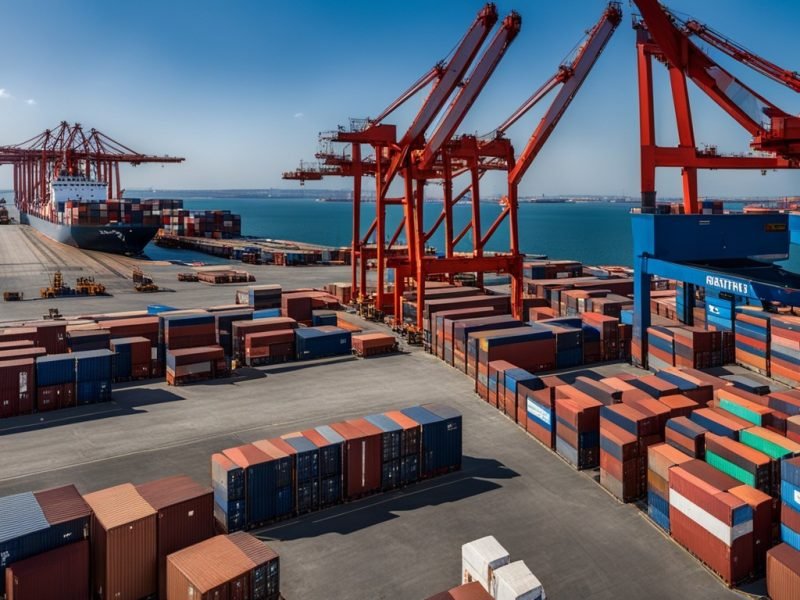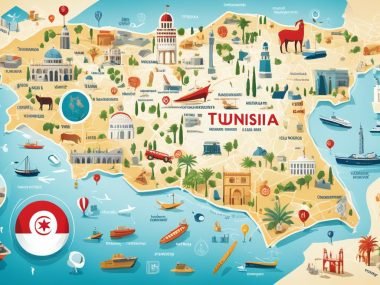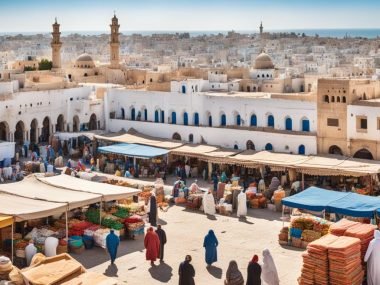Goods enter Tunisia mainly by sea, with over 90% of trade happening this way. The country’s ports saw 27.2 million tonnes of goods in 2019. Rades port is especially key for container shipping. Bizerte and Skhira are vital for moving petroleum, and Sfax is also important.
Air freight, though less used, is crucial, with Tunis Carthage Airport handling most of it. Roads and railways play a big part in moving goods around Tunisia. They link ports and airports to various places, making sure everything is well connected.
Key Takeaways
- Tunisia relies on maritime transport for over 90% of its international trade.
- The country’s ports handled 27.2 million tonnes of goods in 2019.
- Rades is the primary container port, with Bizerte, Skhira, and Sfax also playing crucial roles.
- Air freight is significant, with Tunis Carthage Airport handling 97% of airborne cargo.
- Extensive road and rail networks facilitate the distribution of goods within Tunisia.
Major Ports and Airports in Tunisia
Tunisia is vital for logistics and transport with its top-notch ports and airports. These are key for smooth shipping to Tunisia and moving goods across the nation.
Sea Ports in Tunisia
The country’s sea network is strong. It includes several major ports in Tunisia that play unique roles in logistics:
- Port of la Goulette – Boosts tourism and looks after passengers.
- Port of Bizerte – Key for industry and trade.
- Port of Gabes – Known for chemicals and bulk goods.
- Port of Rades – The main spot for containers.
- Port of Sousse – Deals with goods for the central coast.
- Port of Sfax – Vital for commerce.
- Port of Zarzis – Helps the South and has a free trade area.
- La Skhirra – Important for oil shipping.
Airports in Tunisia
Tunisian airports are just as crucial, supporting air freight and making sure freight forwarding to Tunisia is efficient. The top airports are:
| Airport | Role |
|---|---|
| Tunis-Carthage | Major air freight centre |
| Monastir Habib Bourguiba | Boosts tourism and handles passengers |
| Tozeur-Nefta | Aims at tourism |
| Sfax-Thyna | Meets commercial export needs |
| Gafsa-Ksar | Supports regional and mining transport |
Knowing about these ports and airports shows us Tunisia’s complex and skilled logistics network. It helps with successful shipping to Tunisia and improves the country’s logistics system.
Transporting Goods by Sea
Moving goods to Tunisia by sea is crucial for its trade. A range of services meets different transport needs. These include container shipping and bulk transport.
Sea Freight Services
Many logistics companies provide comprehensive sea freight services to Tunisia. These services have varying travel times. For example, a trip from Tunisia to the UK takes about fifteen to thirty-five days. The route and service chosen affect the time.
Companies like KTL Europe UK play a critical role. They offer all-in-one sea freight solutions. This includes customs help and inland transport. Their services ensure a smooth journey from start to finish.
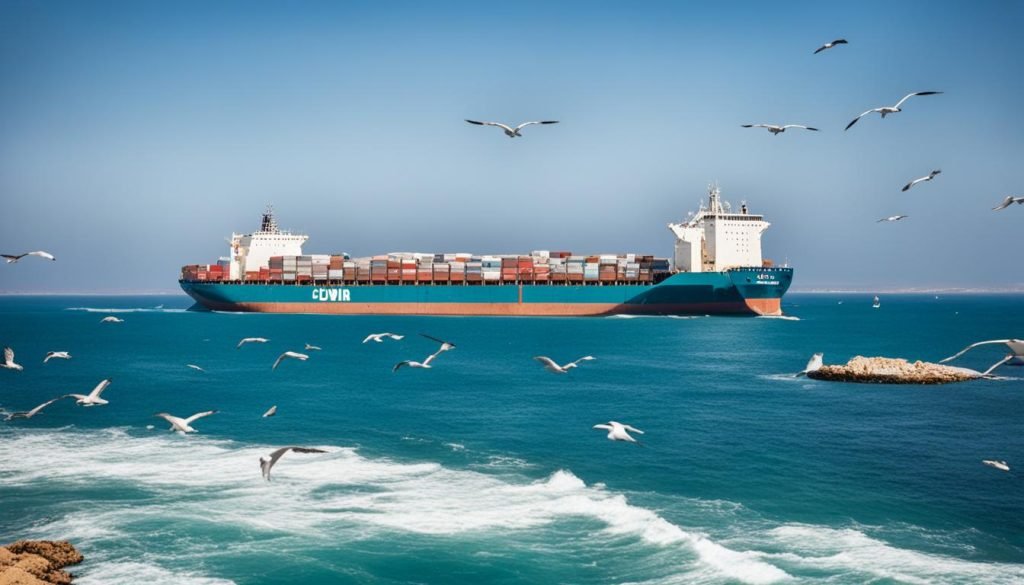
Major Shipping Companies
In Tunisia, big shipping companies boost sea freight. One of the main ones is the Compagnie Tunisienne de Navigation. It offers reliable routes and timetables.
These firms extend Tunisia’s trade reach by sea. They also promise secure and prompt transport. Using services from these big companies is key for business supply chains.
| Service Provider | Type of Service | Transit Time |
|---|---|---|
| Compagnie Tunisienne de Navigation | Container Shipping, Bulk, Breakbulk | 15-35 Days |
| KTL Europe UK | Sea Freight, Customs Brokerage, Inland Transportation | 15-35 Days |
Transporting Goods by Air
Using air freight to send items to Tunisia is very efficient for urgent or valuable goods. Tunis Carthage Airport is the main spot for air cargo, handling most of the work. Many logistics companies make sure things pass through customs quickly and get delivered on time. So, air transport is key to Tunisia’s trade.
KTL Europe UK delivers top-notch logistics solutions for flying goods to Tunisia. They serve many industries, ensuring cargo is dealt with skilfully and safely. This is crucial for companies to keep their supply chains smooth.
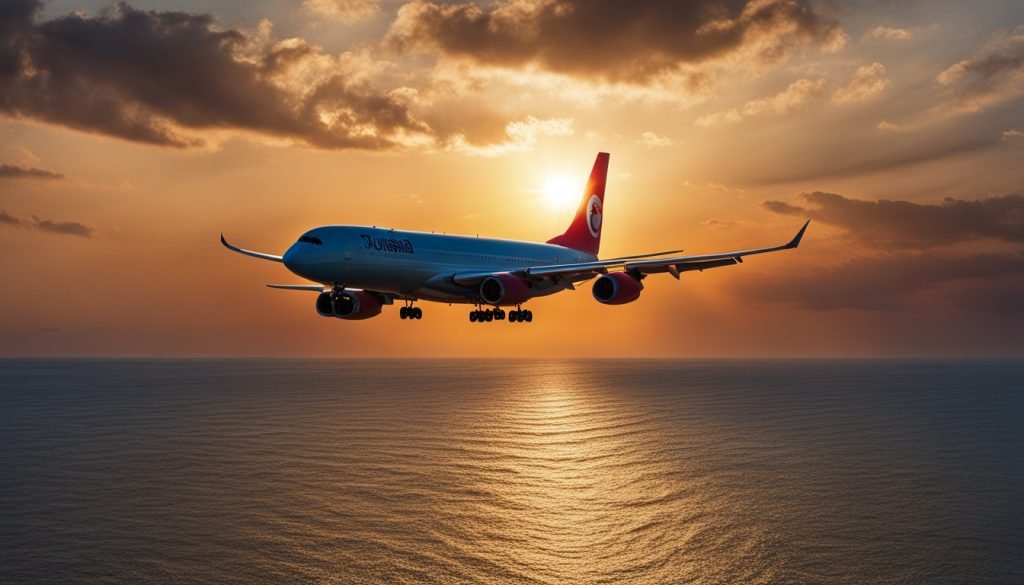
How Are Goods Transported To Tunisia?
To move goods into Tunisia smoothly, it’s vital to grasp the Tunisian import process. This usually means going through detailed customs checks, paying duties and taxes on time, and following local rules closely. Companies like KTL Europe UK step in here, providing end-to-end services that make this whole process simpler.
Customs and Import Process
The first step in Tunisia’s import process is having all your documents ready. This includes invoices and permits, among others. Customs officers then carefully check the goods to see if they meet Tunisian rules. After this, duties and taxes are worked out and must be paid to clear the goods. Logistics experts in Tunisia can help make sure your paperwork is spot on and handed in quickly.
Logistics and Supply Chain
For goods to move smoothly within Tunisia, a strong supply chain is key. The country’s wide road and rail system is crucial for getting goods from ports and airports to local areas. This network is good for both international and local trade, making transportation efficient and not too expensive. With trusted providers like KTL Europe UK, you get comprehensive solutions like warehousing and distribution that help smooth out the supply chain.
Conclusion
Transporting goods to Tunisia needs a well-rounded strategy. The country largely depends on its maritime transport. Key ports like Rades and Bizerte play a crucial role in its trade.
Companies such as Compagnie Tunisienne de Navigation are vital. They help move goods efficiently across the Mediterranean.
Air freight also plays a key role, especially for urgent or delicate items. Tunis Carthage Airport is the main hub. Firms like KTL Europe UK offer fast and secure transport.
Knowing Tunisia’s customs and import process is crucial for success in trade. Firms should get familiar with local rules. This, along with Tunisia’s strong road and rail networks, supports smooth distribution.
Thus, both sea and air routes ensure effective transportation to Tunisia. This is backed by a detailed and efficient logistics framework.

